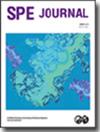A Sealability Study on Bismuth-Tin Alloys for Plugging and Abandonment of Wells
IF 3.2
3区 工程技术
Q1 ENGINEERING, PETROLEUM
引用次数: 0
Abstract
The use of bismuth alloys as a barrier material for plugging and abandonment (P&A) has gained traction in the literature due to the large number of wells scheduled to be plugged and abandoned. In addition, many questions have been raised regarding the sealing efficiency of cement in the long run. Within this context, this work performs a thorough study of the sealability of plugs made with the eutectic bismuth-tin alloy. This effort is divided into three fronts: laboratory tests to verify the pressure resistance and leakage rate of these plugs, microscopy analyses to corroborate the tests’ insights through observations of the alloy microstructure, and numerical simulations to capture and model the involved phenomena aiming to reproduce real well scenarios in the future. Results show that bismuth-tin plugs exhibit better pressure resistance and lesser leakage rates than cement plugs, which indicates that this material is a suitable candidate. Better sealing properties are achieved when the plugs are set under higher curing pressures than the atmospheric pressure, an observation that is confirmed when observing the microstructures formed. Finally, a suitable material model that captures the expansion upon solidification is proposed, and the effect of thermal expansion on the plug and pipe assembly is observed.用于堵塞和废弃水井的铋锡合金密封性研究
由于计划堵塞和废弃的油井数量庞大,使用铋合金作为堵塞和废弃(P&A)的阻隔材料在文献中越来越受到重视。此外,人们还对水泥的长期密封效率提出了许多疑问。在此背景下,本研究对使用共晶铋锡合金制成的堵塞的密封性进行了深入研究。这项工作分为三个方面:实验室测试以验证这些塞子的耐压性和泄漏率;显微镜分析通过观察合金的微观结构来证实测试结果;以及数值模拟以捕捉相关现象并建立模型,目的是在未来再现真实的油井情况。结果表明,与水泥塞相比,铋锡塞具有更好的耐压性和更低的漏失率,这表明这种材料是一种合适的候选材料。在固化压力高于大气压力的情况下,塞子的密封性能更佳,观察形成的微观结构也证实了这一点。最后,我们提出了一种能够捕捉凝固时膨胀的合适材料模型,并观察了热膨胀对塞子和管道组件的影响。
本文章由计算机程序翻译,如有差异,请以英文原文为准。
求助全文
约1分钟内获得全文
求助全文
来源期刊

SPE Journal
工程技术-工程:石油
CiteScore
7.20
自引率
11.10%
发文量
229
审稿时长
4.5 months
期刊介绍:
Covers theories and emerging concepts spanning all aspects of engineering for oil and gas exploration and production, including reservoir characterization, multiphase flow, drilling dynamics, well architecture, gas well deliverability, numerical simulation, enhanced oil recovery, CO2 sequestration, and benchmarking and performance indicators.
 求助内容:
求助内容: 应助结果提醒方式:
应助结果提醒方式:


